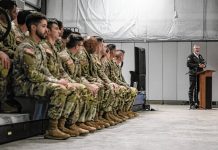The leader of the Indiana National Guard has been on the job for about 15 months, but in that relatively short time his focus has included efforts involving Camp Atterbury and the Muscatatuck Urban Training Center.
Maj. Gen. Corey Carr, a Columbus resident and the adjutant general of the Indiana National Guard, is working to increase cyber training at Muscatatuck to aid in response and defense.
He’s also working to institute a wellness center at Atterbury to help soldiers achieve greater physical fitness so they can remain in the Guard.
Carr, also a former executive director of the Columbus Economic Development Corp., shared this information and other details of the Indiana National Guard’s efforts as the guest speaker at the Columbus Rotary Club’s meeting Monday.
The Army Wellness Center and Resilience Campus is scheduled to open Oct. 1 at Camp Atterbury near Edinburgh, Carr said.
At the center, a variety of machines and tests will determine soldiers’ body composition, metabolism, cardiovascular capability and other physical components to get an accurate understanding of their fitness level. That information will be shared with fitness specialists and nutritionists who come up with a personalized wellness, fitness and nutrition plan for each soldier, the adjutant general said.
The Guard is increasingly concerned about the number of soldiers who are not passing their annual physical fitness test, he said. “What happens when you can’t pass your fitness test is we can’t send you to school, we can’t promote you and we can’t re-enlist you,” Carr said.
Of 1,200 National Guard soldiers eligible for re-enlistment this year, 300-plus were failing height/weight or physical fitness and were not allowed to re-enlist.
“I have the ability to give them a one-year waiver, but if I don’t intervene and do something to help them, that just delays the inevitable,” Carr said.
Wellness centers in the Army started as a pilot program and were found to be successful. More than 30 are used at active-duty military installations across the country, but Atterbury will be the first reserve component to have one, Carr said.
Besides part-time National Guard soldiers, active members, veterans, civilian contractors and family members also can use the wellness center’s services. The family component is especially important for the part-time soldiers, the adjutant general said.
“What we believe is if we want to effect lifestyle change, we need to get the family engaged,” Carr said.
A couple buildings on the Atterbury campus are being renovated, and between those costs, the equipment, salaries and other expenditures, the Indiana National Guard is spending more than $500,000 to get the initiative up and running, Carr said.
The Resilience Campus will offer transition assistance employment, substance abuse, counseling, chaplain services, retention, recruiting and retirement benefits support.
Cyber efforts
Camp Atterbury and Muscatatuck Urban Training Center near Butlerville play important roles in the economic impact of the National Guard. The installations host about 15 training operations annually, some of which draw thousands of participants. A Vibrant Response exercise next year will have about 7,500 participants, for example. The total impact of those exercises to the local economy is estimated at $16.5 million, Carr said.
“Our objective is to grow that,” Carr said, as each of those exercises comes with money to hire people, which can lead to full-time employment opportunities which leads to even more economic activity being generated.
Muscatatuck — a former state hospital that has been transformed to resemble an urban center — is significant because of its unique ability to integrate armed forces and cyber technology, Carr said. Muscatatuck’s cyber range offers targets in the network, such as a water plant with industrial control systems that could be hacked by aggressors, for example.
Army officials agree that Muscatatuck has growth potential, and a request for $35 to $40 million to expand the cyber range is moving forward, although whether more or less will be approved has not been finalized, Carr said.
[sc:pullout-title pullout-title=”About Corey Carr” ][sc:pullout-text-begin]
Name: Courtney P. “Corey” Carr
What: Adjutant general of the Indiana National Guard.
Rank: Major general.
Residence: Columbus.
Military experience: Graduated from the U.S. Military Academy at West Point in 1983; commander of the 1st Battalion of the 151st Infantry, where he led several hundred soldiers and deployed with them to Bosnia; commander of the 138th Regiment Combat Arms in Edinburgh, a training organization for officers and sergeants; and commander of the 76th Infantry Brigade Combat Team, composed of about 4,500, which deployed to Iraq; led 81st Troop Command, also known as Joint Task Force 81, charged with homeland security; deputy director of operations, readiness and mobilization for the U.S. Army at the Pentagon in Washington.
Non-military experience: President of Columbus Economic Development Board, December 2006 to August 2010; worked at Force Construction and Rock-Tenn Co.; area manager for Milestone Contractors; worked at Indiana Department of Transportation as chief of staff, deputy commissioner of highway operations.
Family: Daughter, Reagan; son, Evan.
[sc:pullout-text-end]




